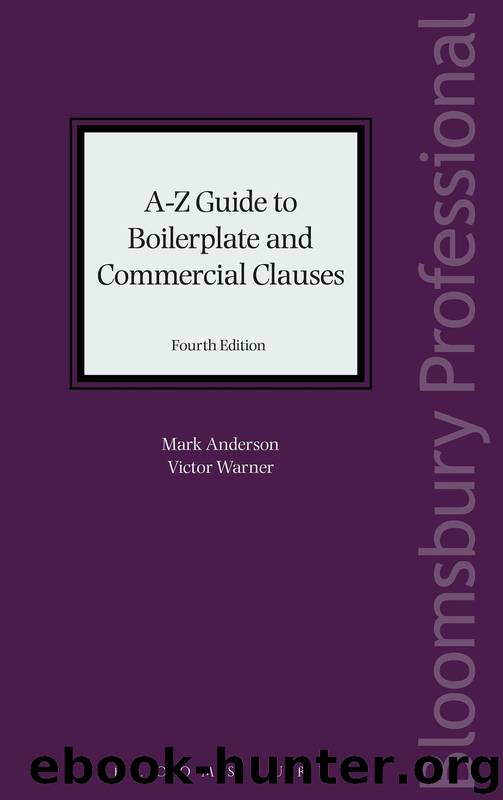A-Z Guide to Boilerplate and Commercial Clauses by Mark Anderson & Victor Warner

Author:Mark Anderson & Victor Warner [Anderson, Mark]
Language: eng
Format: azw3
Publisher: Bloomsbury Publishing
Published: 2017-10-18T04:00:00+00:00
The meaning of ‘beyond the (reasonable) control’
A force majeure provision will often contain wording (shown in italics below) to capture any other event not considered by the parties at the time of the agreement:
‘Neither party shall be liable for any default due to any act of God, war, strike, lockout, industrial action, fire, flood, drought, tempest or other event beyond the reasonable control of either party.’
When including this wording, the following points in particular need to be considered:
•in a clause that contains a number of specific events (such as ‘fire’ etc as in the above example), and which is followed by the phrase ‘or other event beyond the reasonable control of either party’ (or equivalent) it is not only the ‘other event’ which is required to be beyond the reasonable control of a party. All the specific events listed may be interpreted as requiring to be beyond the reasonable control of the party (eg Sonat Offshore SA v Amerada Hess Development [1988] 1 Lloyd’s Rep 145; Frontier International Shipping Corp v Swissmarine Corpn Inc [2005] 1 Lloyd’s Rept 390), depending on the specific wording used in the clause (Emeraldian Ltd Partnership v Wellmix Shipping Ltd [2010] EWHC 1411 (Comm), [2011] 1 Lloyd’s Rep 301). If a party wishes to only have ‘other events’ to be beyond the reasonable control of a party but not specific events, then the specific instances should be clearly separated out from the general circumstances (which is made subject to the reasonable control of a party) (see Precedent 8);
•where a party wishes to rely on wording such as the above, then if there is a dispute, that party will have to demonstrate that:
•its actions or the force majeure event fall within the words used in the force majeure clause;
•it has carried out actions to avoid the force majeure event and also mitigate the effects of the force majeure event (Channel Island Ferries Ltd v Sealink UK Ltd [1998] Lloyd’s Rep 323);
•if a party has:
•made the force majeure event happen;
•asked someone else to create or make the force majeure event to occur (Mamidoil-Jetoil Greek Petroleum Co SA v Okta Crude Oil Refinery AD [2003] EWCA Civ 1031, [2003] 2 All ER (Comm) 640);
•breached the contract and that breach has resulted in a force majeure event (Great Elephant Corp v Trafigura Beheer BV [2013] EWCA Civ 905),
then that party will not normally be able to rely on the wording in a force majeure clause.
Download
This site does not store any files on its server. We only index and link to content provided by other sites. Please contact the content providers to delete copyright contents if any and email us, we'll remove relevant links or contents immediately.
The Social Psychology of Inequality by Unknown(3030)
The Plant Paradox by Dr. Steven R. Gundry M.D(2620)
The Writing on the Wall by Anselm Jappe(2046)
Working for Yourself by J.D. (Nolo) Stephen Fishman(1873)
Get What's Yours for Medicare by Philip Moeller(1740)
Every Landlord's Legal Guide by Janet Portman & Stewart Marcia & Ralph Warner(1675)
The First 20 Hours: How to Learn Anything ... Fast by Kaufman Josh(1666)
ADHD on Trial by Michael Gordon(1578)
Decisive by Chip Heath(1568)
Working for Yourself by Stephen Fishman J.D. (Nolo)(1530)
Drafting Contracts: How and Why Lawyers Do What They Do, Second Edition by Stark Tina L(1499)
A Practical Guide to International Arbitration in London by Hilary Heilbron(1441)
The Lord of the Rings: The Fellowship of the Ring, the Two Towers, the Return of the King by J. R. R. Tolkien(1439)
The Economist Aug 8th 2015 by The Economist(1428)
Restitution by Restitution(1428)
Intellectual Property Strategy by John Palfrey(1425)
The Economist Aug 29th 2015 by The Economist(1391)
Collusion by Luke Harding(1323)
Persuasion by Owner(1297)
